#한국어
VERB PER DAY #3
하다 - to do
Past tense - 했어요
- A:어제 뭐 했어요?
- What did you do yesterday?
- B:나의 숙제를 했어요.
- I did my homework.
어제 - yesterday
뭐 - what
나의 - my
숙제 - homework
Present tense - 해요
- A:무슨 일을 해요?
- What work do you do?
- B: 저는 의사예요.
- I am a doctor.
무슨 - what; what type; what kind
일 - work
의사 - doctor
Present progressive - 하고 있어요
- A:뭐 하고 있어요?
- What are you doing?
- B:운동을 하고 있어요.
- I am exercising.
운동 - exercise (noun)
Future tense - 할 거예요
- A:너 왜 이렇게 빨라요?
- Why are you so fast?
- B:제 친구가 기다려서 내가 이거를 그냥 빨리 할 거예요.
- My friend is waiting so I’ll just do this quickly
너 - you
왜 - why
이렇게 - so; in a manner; in a way; like this
빠르다 - to be fast (빨라요 - present tense)
제 - my
친구 - friend
기다리다 - to wait
이거 - this
그냥 - just
VERB PER DAY #2
보다 - to see
Past tense - 보 + -았어요 = 봤어요
- 어제 뭐 했어요?
- What did you do yesterday?
- 친구랑 같이 영화를 봤어요.
- I watched a movie with my friend.
Present tense - 보 + -아요 = 봐요
- 요즘 뭐 해요?
- What do you do these days?
- 영화를 봐요.
- I watch movies.
Present progressive - 보 + -고 있어요 = 보고 있어요
- 지금 뭐 하고 있어요?
- What are you doing now?
- 지금 텔레비전을 보고 있어요.
- I am watching TV now.
Future tense - 보 + -ㄹ 거예요.
- 내일 뭐 할 거에요?
- What will you do tomorrow?
- 내일 공원에서 폭죽을 볼 거예요.
- I will watch fireworks tomorrow at the park.
VERB PER DAY #1
먹다 - to eat
Past tense - 먹었어요
- 저는 어제 피자를 먹었어요.
- I ate pizza yesterday.
Present tense - 먹어요
- 오후 열두 시에 점심을 먹어요.
- I eat lunch at 12 pm.
Present progressive - 먹고 있어요
- 지금 빙수를 먹고 있어요.
- I am eating bingsu now.
Future tense - 먹을 거예요
- 나중에 친구들이랑 냉면을 먹을 거예요.
- I will eat naengmyeon later with my friends.
VOCABULARY WORDS #1
The following words are words that are commonly used in a daily conversation. These are helpful and good to know especially to those who are still in a beginner level and to those who are still building up their vocabulary in Korean.
*자주 - frequently / often
*가끔 - sometimes
*거의 - almost
*계속 - continuously
*똑바로 / 바로 - straight
*좀 - please
*가장 - most
*먼저 - ahead / first
*우선 - in the first place
*매우 / 무척 / 아주 - very
*너무 - too / so
*얼마나 - how long/much/many
*정말 - really
*참 - really / very
*많이 - many
*약간 - a few / little
*전혀 - none / not at all
*잘 - well
*일찍 - early
*이따가 - later
*못 / 안 - not
*더 - more
*모두 / 다 / 전부 - all / whole
*또 / 다시 - again / once more
*따로 - separately
*주로 - mainly / usually
*간단히 - simply
*갑자기 - suddenly
*빨리 / 어서 - fast / quickly
*천천히 - slowly
*같이 - together
*벌써 - already
*곧 - soon
*새로 - newly
*금방 - soon
*방금 - just now / seconds ago
*늘 / 항상 - always
*조용히 - quietly
*열심히 - eagerly
*언제나 - whenever
*오래 - for a long time
*없이 - without
*아까 / 좀전에 - a while ago
*특히 / 특별히 - especially
*아직 - yet
*미리 - in advance
*바로 - right now
*직접 - directly
*깜빡 - with surprise
*꼭 - firmly / just
*아마도 - probably
*별로 - particularly
*그냥 - just
*서로 - with each other
안녕하세요 여러분! Hey everyone! I have another Hanja lesson for y’all today – this one is about two possible meanings of 악! I’m planning on posting this to my Instagramtomorrow as well, so be sure to follow me there for more Korean content! I hope this is helpful, and you can let me know if you have any questions! 화이팅!
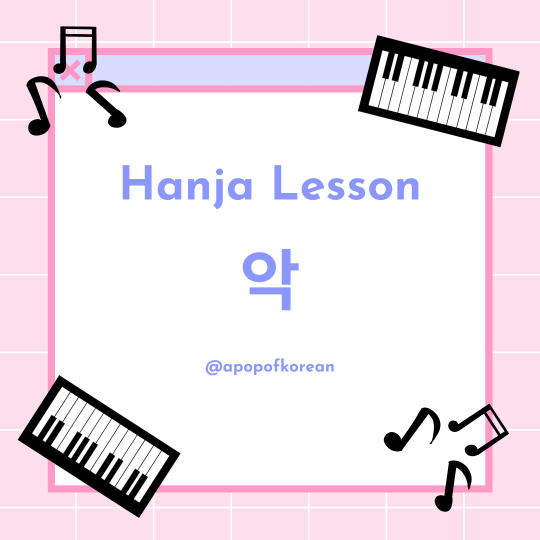
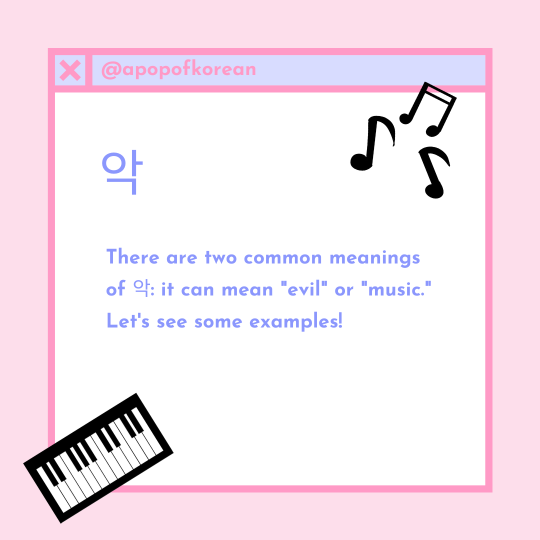
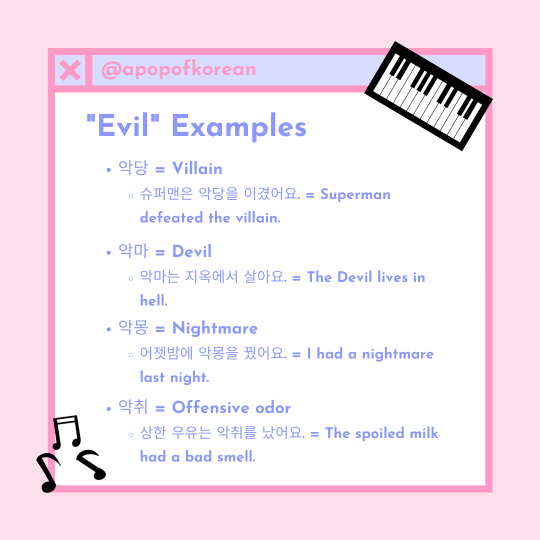
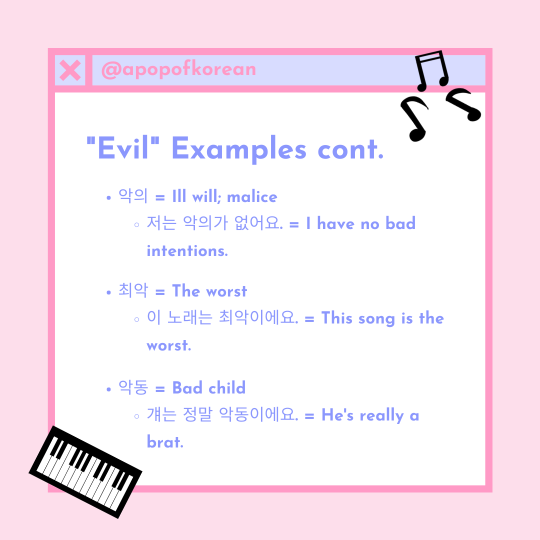


- My masterlist
- Joinmy Discord chat here to practice Korean with others!
- Follow me onInstagram herefor more Korean content!
- GetDrops Premium usingmy affiliate linkto expand your Korean vocab!
- Check out myKo-Fi to support this blog and my studies! Thank you for your generosity!
안녕하세요 여러분! I have another Hanja lesson for y’all – this one is about 수! This lesson doesn’t list every single possible meaning of 수, but these are some common ones. You can find this post on my Instagram as well; be sure to follow me there for more Korean content! I hope this is helpful!

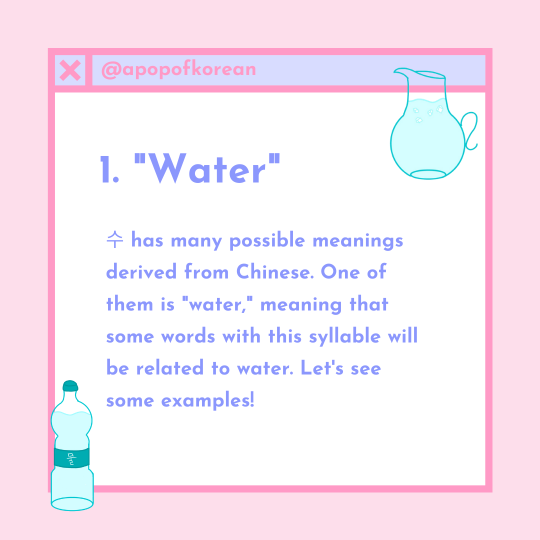
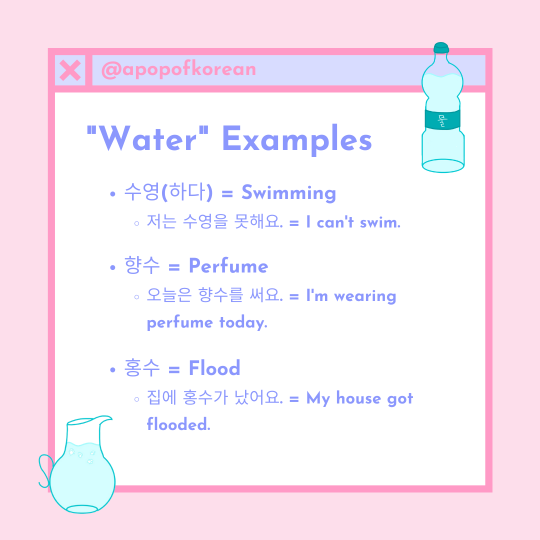

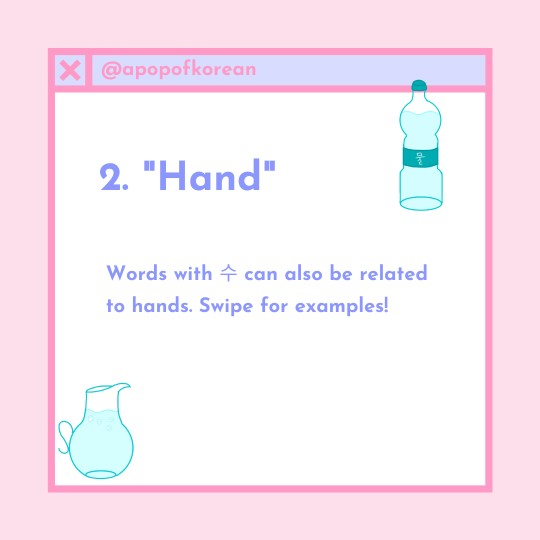
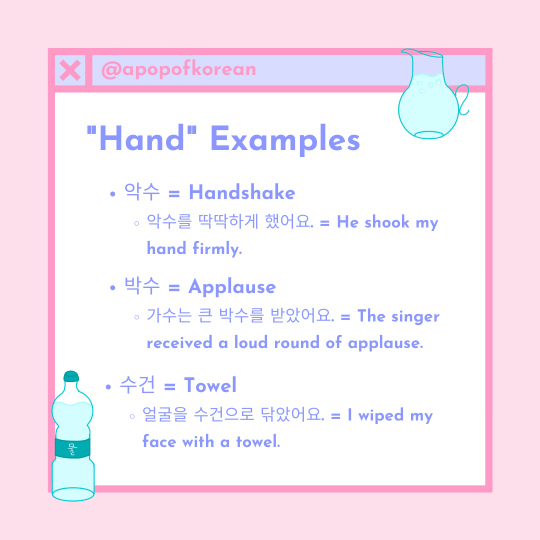
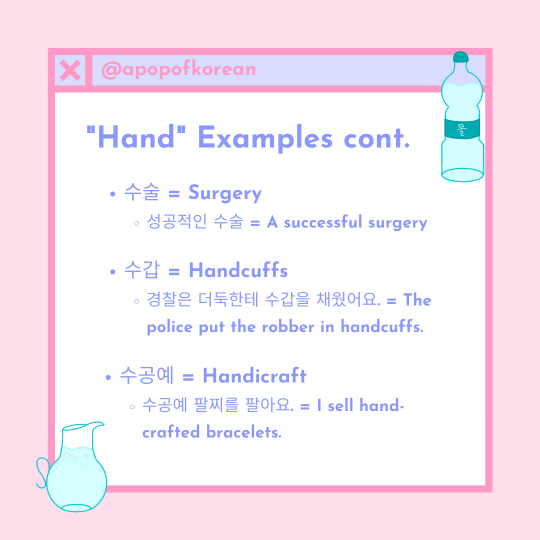

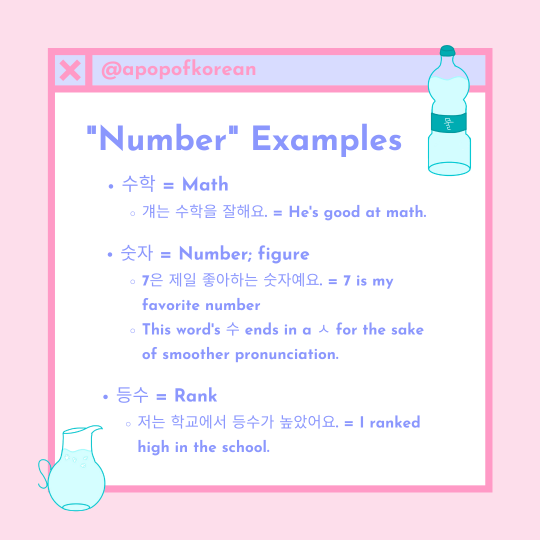
- My masterlist
- Joinmy Discord chat here to practice Korean with others!
- Follow me onInstagram herefor more Korean content!
- GetDrops Premium usingmy affiliate link to expand your Korean vocab!
- Check out myKo-Fito support this blog and my studies! Thank you for your generosity!
안녕하세요 여러분! Hey everyone! Today’s lesson is about -고 보니까, which is one way to express realization. Let’s start!
Use this formula:
- [verb stem] + 고 보니까 + [rest of sentence]
- The -까 can be dropped with no difference in meaning.
This structure is used to express your realization after you finish doing an action. Let’s look at an example:
- 한국어 수업을 듣고 보니까 꽤 어렵더라고요. = After taking a Korean class, I’ve realized that it’s quite difficult.
This sentence communicates your realization after you completed the action of taking a Korean class, that realization being that Korean is difficult to learn. I want to emphasize that this structure can only be used when talking about a completed action, not one that is currently in progress.
Notice that this structure is seen in sentences that have other endings communicating some sort of realization or surprise like 것 같다, -네요,and-더라고요. Let’s see some more examples!
- 책을 다 읽고 보니까 생각보다 재미있어요. = After reading the book, I see that it’s more interesting than I thought.
- 그러고 보니까 그 콘서트 표는 꽤 비싸네요. = Now that I think about it, that concert ticket it quite expensive.
- 그러고 보니 is a fixed expression meaning “now that I think about it” or “come to think of it.”
- 처음에는 김치를 싫었는데 다시 먹어보고 보니 괜찮더라고요. = At first, I didn’t like kimchi, but after trying it again, it’s okay.
- 원래는 걔가 좀 차가운 것 같지만 더 친해지보니 아주 착하네요. = Originally I thought she was a little cold, but now that I’ve gotten closer to her, she’s very nice.
That’s about it for this lesson! Lmk if you have any questions :) See you in the next one! 다음에 또 봐요!
- My masterlist
- Joinmy Discord chat here to practice Korean with others!
- Follow me onInstagram herefor more Korean content!
- GetDrops Premium using my affiliate link to expand your Korean vocab!
- Check out myKo-Fito support this blog and my studies! Thank you for your generosity!
Some of these styles are difficult to describe, so if my description doesn’t make sense, google image search should make it clear.
생머리, straight hair
곱슬머리, curly hair
층을 내다, to get layers
머리를 다듬다, to trim hair
Men’s styles (남성헤어스타일)
바가지머리, a bowl cut
까까머리, a buzz cut
이대팔, a man’s haircut which is parted to the side (the ratio is 2:8)
오대오, a man’s haircut which is parted in the middle (the ratio is 5:5)
댄디컷, a man’s haircut which is long with bangs
투블록, a man’s haircut which is shaved underneath and longer on top
맥가이버 머리, a mullet
울프컷, a short mullet
대머리/삭발, bald
반삭머리, hair that is very short (but longer than a buzz cut)
리젠트, the pompadour
올백, slicked-back hair
드레드록스, dreadlocks
Women’s Styles (여성헤어스타일)
단발머리, a bob
숏컷, a boy cut
파마/펌, a perm
똥머리/당고머리, a bun
만두머리, two buns on side of head
양갈래머리/삐삐머리/트윈테일, pigtails
옆가르마, side part (가르마 means part)
올림머리, an up-do
땋은머리, braided hair
디스코머리, french braided hair
히메컷, hair with choppy side layers
벼머리, a small braid which is braided into the rest of the hair
포니테일, a ponytail
꽁지머리, a low ponytail
사과머리, one small lock of hair tied up on the top of the head (to look like the stem of an apple)
반머리, half of the hair tied up at the back of the head
아줌마파마, the classic curly perm that Korean ajummas often have
Bangs (앞머리/뱅)
일자앞머리, straight bangs
쉼표머리, bangs that curl to the side (like a comma)
여신앞머리, long bangs parted to each side down the middle
시스루 뱅 앞머리, thin see-through bangs
처피뱅, choppy bangs
깻잎머리, side bangs which are pinned to the side of the head (to create a shape that looks like a leaf)
hi everyone
~ 정황이 포착되다, to be caught/discovered
산하기관, affiliated organization
사표를 내다, hand in one’s resignation
헌신적인 사랑, selfless(devoted) love
정의롭다, righteous
활력소, the lifeblood/zest of smth
파티의 활력소, the life of the party
무산되다, fail//fall apart
적격자, a qualified person/a qualified candidate
돌연, suddenly/unexpectedly
일련의, a series of
품성, character
품성의 좋은/착한 사람, a person of good character
품성에 -를 심다, to instill – in one’s character
도덕적 품성, moral character
품성을 도야하다, to build character
비천하다, humble/lowly
비천한 배경, a humble (ie poor) background
비천한 출신의 사람, a person of humble beginnings
비천한 가문 출신, a humble family background
This is vocabulary from “Oh! My Mistake (예쁜 게 죄)” by APRIL (에이프릴). All verbs are in their infinitive form and the list is in alphabetical order.
갖다 - to have
계속 - continuously
그리다 - to depict
기쁨 - joy/happiness
꽃 - flower
나비- butterfly
낮 - daytime
녹다 - to melt
눈빛- expression in one’s eyes
느낌 - feeling
다가오다 - to come closer
달콤하다 - to be sweet
떠오르다 - to come up
떨리다 - to tremble
마음 - heart
마치 - as if
만들다 - to make
망설이다 - to hesitate
매번 - every time; always
문제 - problem
믿다 - to believe
바라보다 - to look at
반짝이다 - to glitter
반하다 - to fall in love (with)
밤 - night
보내다 - to send
빛 - gleam/light
빠지다- to fall (for)
빨개지다 - to turn red
사라지다 - to disappear
사랑하다 - to love
사탕 - candy
상상 - imagination
새벽 - dawn
생각 - thought
손길 - touch
스치다 - to brush (past/against)
시선 - one’s eyes
신호 - signal
아픔 - pain
앉다 - to sit
얼굴 - face
예쁘다 - to be pretty
외롭다 - to be lonely
웃음 - smile
원래 - originally
원하다 - to want
유혹하다 - to tempt
자꾸 - again and again
제발 - please
좋아하다 - to like
죄 - sin; crime
준비 - preparation
진심 - sincerity
태어나다 - to be born
표정 - facial expression
핑크 - pink
함께 - together
홀리다 - to be bewitched (by)
This is vocabulary from “Hi High” by 이달의 소녀 (LOONA). All verbs are in their infinitive form and the list is in alphabetical order.
가끔- sometimes
걱정 되다 - to be worried
계속 - continuously
기다리다 - to wait
기분 - feeling
김밥 - kimbap
꿈 - dream
놀리다 - to tease
달아올라다 - to blush; to get excited
달콤하다 - to be sweet
더욱 - increasingly
데려가다 - to take
두근두근 - heart beating sound
두렵다 - to be afraid
뛰다 - to run
듣다- to listen
들키다 - to be discovered
만두 - mandu (dumplings)
많다 - to be a lot
말 - words
말하다 - to talk
밀당 - push and pull; playing hard to get
맘 - heart (short for 마음)
매콤하다 - to be spicy
매콤새콤하다 - to be spicy and sour
묻다- to ask
받다 - to receive
비밀 - secret
빨리 - quickly
사랑 - love
사랑하다 - to love
사실 - honestly
상큼하다 - to be fresh
상큼매콤하다 - to be fresh and spicy
새콤달콤하다 - to be sweet and sour
세상 - the world
소심해지다 - to become shy/timid
수능 - korean college enterance exam (수학 능력 시험)
쉽다 - to be easy
시간 - time
아주 - very
안달 나다 - to be impatient/anxious
알다 - to know
얘기 - story
어지러워지다 - to become dizzy
예쁘다 - to be pretty
이기적 - selfish
이렇다 - to be this way
자꾸 - often
자주하다 - to do it often
잔인하다- to be cruel
전부 - all
조금- a little
조심 - caution; carefully
지치다 - to be tired
톡톡하다- to text (from 카톡하다)
특별하다- to be special
필요하다 - to need
하루 - day
This is vocabulary from 죽겠다 (Killing Me) - iKON. All verbs are in their infinitive form and the list is in alphabetical order.
가슴 - heart; chest
각오 - determination
개입되다 - to get involved
괴롭히다 - to torment; to trouble
그리움 - longing (for)
깜깜하다 - to be very dark
꺼지다 - to be extinguished
남 - others
남다 - to remain
눈물 - tear (drops)
달리 - differently
닮다 - to resemble
대하다 - to face
돌아서다 - to turn back
떼다 - to detach
또 - again
마음 - heart
만나다 - to meet
무게 - weight
무너지다 - to collapse
미련 - lingering attachment
반 - half
버리다 - to abandon/give up
불씨 - embers
비슷하다 - to be similar
사이- relationship
세상 - world
쉽다 - to be easy
습관 - habit
어김없이 - certainly; without fail
외로움 - loneliness
외롭다 - to be lonely
외면하다 - to disregard
이별 - farewell
이기적 - selfish
잘 먹다 - to eat well
잘 살다 - to live well
저리다 - to ache
존재 - existence
죽다 - to die
죽어있다 - to be dead
타오르다 - to blaze
택하다 - to choose
해방감- sense of freedom
허탈하다 - to be dispirited
헤어지다- to break up
헤어짐 - breakup
혼자 - alone
흔적 - trace; mark
후회 - regret
HAPPY VALENTINE’S DAY PART II!!! This is vocabulary from It’s You (feat. Zico) - Sam Kim. All verbs are in their infinitive form and the list is in alphabetical order.
가끔 - sometimes
갖다 - to have
개수작 - nonsense
거치다 - to pass through
걷다- to walk
게임 - game
고민하다 - to worry
고백 - confession
고통스럽다 - to be agonizing/painful
굴곡 - bend; curve
궁금하다 - to be curious
기분 - feeling
깜깜하다 - to be very dark
깨다- to wake up
나서다 - to take action
낮 - daytime
느끼다 - to feel
능숙하다 - to be good at
답답하다 - to be stifling
돌다 - to go around; to circle
떠들다 - to talk
마음 - heart
맞다 - to be right
물어보다- to ask
밤 - night
보내다 - to send
부담 - burden
뾰족하다 - to be sharp
새벽- dawn
생각 - thought
서투르다 - to be poor at
시뮬레이션- simulation
신호- signal
쓰라림 - bitterness; pain
안다 - to hug
아마 - probably
어색하다 - to be awkward
얼굴 - face
연락하다 - to contact
원하다 - to want
이미 - already
이야기 - story
작사하다 - to write the lyrics to a song
잡다 - to hold
전개되다 - to develop
정신 차리다 - to recover one’s senses
좋아하다- to like
직접 - personally
진심 - sincerity
짜증 나다 - to be irritated
춥다 - to be cold (weather)
충분히 - sufficiently
통하다 - to get through
표현 - expression
혼자 - alone
확실해지다 - to become certain/clear
환심- favor
홧김 - fit of anger
힌트 - hint
HAPPY VALENTINE’S DAY PART I!!! This is vocabulary from Forever Yours (feat. 소유)” - Key (키). All verbs are in their infinitive form and the list is in alphabetical order.
가득 차다 - to be chock-full
가득하다 - to be full
가지다 - to have
갑자기- suddenly
곳 - place
기다리다 - to wait
기분 - feeling
깊이 - deep(ly)
꽉 - tightly
낮 - daytime
놓치다 - to let go
다르다 - to be different
닮다 - to resemble
떠나다 - to leave
뜨다 - to float
만나다 - to meet
매일- everyday
멀다 - to be far
멈추다 - to stop
모든 - all; every
무심하다- to be indifferent
믿다 - to believe
밤 - night
빛 - light
빠지다- to fall
살짝 - slightly
새롭다 - to be new
색 - color
생각 - thought
생각 나다 - to come to mind
선명하다 - to be vivid
세상 - the world
싫다 - to dislike
쏟아지다 - to pour out
쓰러지다 - to collapse
엔진 - engine
열다 - to open
요즘 - these days
우주 - universe
유난히 - particularly
이어지다 - to be connected
잃다 - to lose; to stray
자꾸 - repeatedly
전부- all
쥐다 - to hold
짙다 - to be dark; to be thick
짧다- to be short/brief
칠하다 - to paint
커튼 - curtain
터지다 - to pop
표정 - expression
풍선 - balloon
하루 - day
허공 - the air
헤매다 - to wander
확실하다 - to be certain
this is a list of 50 nouns that can be turned into verbs by using this method. by learning these 50 nouns, you also learn 50 verbs which will help you expand your vocabulary in an easy and effective way
건강 [health] →건강하다[to be healthy]
행복 [happiness] → 행복하다 [to be happy]
말 [language; speech] → 말하다 [to speak]
청소 [cleaning] → 청소하다 [to clean]
이해 [understanding; comprehension] → 이해하다 [to understand]
대화 [conversation] → 대화하다 [to converse]
전화 [phone call] → 전화하다 [to make a phone call]
이야기 (얘기) [story; talk] → 이야기하다 (얘기하다) [to tell; to talk]
추억 [memory] → 추억하다 [to remember; to reminisce]
가능 [possibility] → 가능하다 [to be possible]
추천 [recommendation] → 추천하다 [to recommend]
확인 [confirmation] → 확인하다 [to confirm]
취소 [cancellation] → 취소하다 [to cancel]
완성 [completion] → 완성하다 [to complete]
예약 [reservation] →예약하다 [to reserve]
식사 [meal] → 식사하다 [to have a meal]
긴장 [tension] → 긴장하다 [to be nervous]
표현 [expression] → 표현하다 [to express]
저장 [storage] → 저장하다 [to save; to store]
불안 [anxiety] → 불안하다 [to be anxious]
불편 [discomfort] → 불편하다 [to be uncomfortable]
후회 [regret] → 후회하다 [to regret]
연구 [research] → 연구하다 [to research]
포기 [abandonment] → 포기하다 [to give up]
결심 [decision] → 결심하다 [to decide]
해결 [solution] → 해결하다 [to solve]
연습 [practice] → 연습하다 [to practice]
이혼 [divorce] → 이혼하다 [to get a divorce]
초대 [invitation] → 초대하다 [to invite]
정리 [organization; arrangement] → 정리하다 [to organize; to arrange]
참석 [attendance; presence] → 참석하다 [to attend; to be present]
실패 [failure] → 실패하다 [to fail]
발표 [presentation] → 발표하다 [to present]
구경 [sight-seeing] → 구경하다 [to sight-see]
상상 [imagination] → 상상하다 [to imagine]
운동[exercise] → 운동하다[to exercise]
방문 [visit] → 방문하다 [to visit]
기록 [record; document] → 기록하다 [to record; to document]
발달 [development] → 발달하다 [to develop]
만족 [contentment; satisfaction] → 만족하다 [to be content; to be satisfied]
관찰 [observation] → 관찰하다 [to observe]
고생 [hardship; suffering] → 고생하다 [to suffer; to have a hard time]
반대 [the opposite] → 반대하다 [to oppose]
계산 [calculation] → 계산하다 [to calculate]
무시 [disregard] →무시하다 [to disregard; to ignore]
결정 [decision] → 결정하다 [to decide]
사랑 [love] → 사랑하다 [to love]
거짓말 [lie] → 거짓말하다 [to lie]
강조 [emphasis] → 강조하다 [to emphasize]
창피 [embarrassment] → 창피하다 [to be embarrassing]
*all of these verbs can also be written as “noun을/를 하다”
practice on quizlet
This is vocabulary from Right Here - The Boyz (더보이즈). All verbs are in their infinitive form and the list is in alphabetical order.
가까이 - close (to)
가져가다 - to take
간단하다 - to be simple
감싸다 - to cover; to surround
겹치다 - to overlap
결국 - in the end; ultimately
결말 - ending
곁에 있다 - to be by one’s side
계획 - a plan
기대하다 - to anticipate
긴장감 - tension
놓다 - to let go (of)
눈빛 - the expression in one’s eyes
눈이 마주치다 - to meet eyes
느낌 - feeling
다가가다 - to approach; to go closer
다가오다 - to approach; to come closer
다르다 - to be different
답 - answer
되돌리다 - to go back
들어오다 - to enter
들키다 - to be caught
멈추다 - to stop
미소 - smile
벗어나다 - to escape; to break away (from)
복잡하다 - to be complicated
본능 - instinct
비교 - comparison
빠져들다 - to fall into; to fall for
생각 - thought
시선 - one’s eyes
알다 - to know
어렵다 - to be difficult
어서 - quickly
역시 - as expected
예감이 들다 - to have a hunch/feeling
완벽해지다 - to become perfect
움직이다 - to move
이끌다 - to lead
이미 - already
절대 - never
점점 - gradually
정답 - right answer
정해지다 - to be decided; to be fixed
조금만 - just a little
직감 - intuition
짐작하다 - to guess
피하다 - to avoid
This is vocabulary from 나나나 (懦那䛔) - 임팩트 (IMFACT). All verbs are in their infinitive form and the list is in alphabetical order.
계속- continuously
공허하다 - to be empty
깨다 - to wake (up)
꿈 - dream
녹이다 - to melt
놓다 - to let go (of)
두렵다 - to be fearful (of)
들어오다 - to enter
등돌리다 - to turn one’s back (등을 돌리다)
따듯하다 - to be warm
마음 - heart; mind
매일 밤 - every night
멍청하다- to be stupid
미소- smile
미치다 - to be crazy
믿다 - to be believe
바보 - fool
밝히다- to brighten (up)
변하다 - to change
불안하다 - to be anxious; to be insecure
사실 - actually; tbh
살다 - to live
삶 - life
세상 - the world
손을 잡다 - to hold hands
아름답다 - to be beautiful
안다 - to hug
어울리다- to match; to suit
영원하다 - to last forever
완전하다 - to be complete
외면하다 - to turn one’s face away; to disregard
욕하다 - to curse; to swear
웃다 - to laugh; to smile
원래 - originally; by nature
원하다 - to want
위험하다 - to be dangerous
이유 - reason
절대 - never
정말 - really
조금씩- gradually
차갑다 - to be cold
하루 - day
향하다 - to face
흐려지다- to become blurred
This post will show you how to change nouns into verbs; if you want to see how to turn verbs into nouns, check out this post. In some cases, not all, nouns can be turned into verbs by simply adding the verb 하다 (to do).
some example words
수영 [swimming] + 하다=수영하다 [to swim]
모험 [adventure] + 하다=모험하다 [to have an adventure]
여행[travel; traveling] + 하다=여행하다 [to travel]
사랑 [love] + 하다=사랑하다 [to love]
공부 [studying] + 하다=공부하다 [to study]
도착 [arrival] + 하다=도착하다 [to arrive]
운전 [driving] +하다=운전하다 [to drive]
노래 [song] + 하다=노래하다 [to sing]
example sentences:
수영하러 가고 싶어요.
= I want to go swimming.
지난주에 한국에 도착했어요.
= I arrived in Korea last week.
노래하고 춤추기 너무 좋아요.
= I really like singing and dancing.
*in order to negate the verb, there are two options: add안 between the noun and 하다 [공부 안 하다], or attach ~지 않다 to the verb stem [공부하지 않다]
vocabulary
가다 - to go
지난주 - last week
한국 - korea
춤추다 - to dance
너무 - very; too
좋다 - to be good
A second K-Pop post for today because I love both comebacks and why not ^_^ This is vocabulary from “Power Up” by Red Velvet. All verbs are in their infinitive form and the list is in alphabetical order.
까맣다 - to be jet-black
날다 - to fly
놀다 - to play
놀리다 - to make fun of; to tease
던지다- to throw
돋다 - to sprout; to come out
들뜨다- to be excited
떠나다 - to leave
뜨겁다 - to be hot
레벨업 - level up (pronounced the same as 레베럽 aka reveluv ;)
마시다 - to drink
말씀하다 - to speak (honorific of 말하다)
매일- everyday
반짝거리다 - to twinkle
반짝이다- to sparkle
백그라운드 뮤직 - background music
번개 - lightning
벌써 - already
본능적 - instinctive
새롭다 - to be new
3시- 3 o’clock
소름- goosebumps
선생님 - teacher
시간 - time
신나다 - to be exciting
아무것 - anything
아이스 아메리카노 - iced americano
아스팔트 - asphalt
에너지 - energy
엔진 소리 - sound of an engine
열정 - passion
오늘 밤 - tonight
50도 - 50 degrees
온도 - temperature
완전 - complete
원하다 - to want
유달리 - particularly
일하다 - to work
제일 - most
좋아하다- to like
즉흥적- impromptu; improvisational
즐겁다 - to be enjoyable
짜릿하다 - to be thrilling; to be exhilarating
차갑다 - to be cold
찾다 - to find
천재적 - talented
타다 - to burn
타오르다 - to flare; to go up
태양- the sun
파도 - wave
파워 - power
필요하다 - to need
후끈후끈하다 - to be hotly
This is vocabulary from “My Pace” by Stray Kids. All verbs are in their infinitive form and the list is in alphabetical order.
가득 - full; filled
갈림길 - crossroads; forked road
결승선 - finish line
계속- unceasingly
고르다 - to choose
고민 - worry
괜찮다 - to be fine
그냥 - just
급하다 - to be urgent
남 - others
내리다 - to unload; to leave
다르다 - to be different
달리다 - to run
닮다- to resemble
돌아보다 - to look back
뒤처지다 - to fall behind
따르다 - to follow
먼저 - first
멀리- far away
모르다 - to not know
목적지- destination
반 - half
부럽다 - to be jealous; to be envious
불안감 - anxiety
비교 - comparison
비교하다 - to compare
비다 - to be empty
선택 - choice
앞서가다 - to go ahead
연속 - continuation; cycle
욕심 - greed
우습다 - to be funny
의미 없다 - to be meaningless
인정하다 - to acknowledge; to admit
일단 - first; for the time being
잊다 - to forget
자꾸 - repeatedly
잘나다 - to be good; to be distinguished
쟤 - him; that person
조급하다 - to be hasty
조르다 - to pester; to bother
지금 - now
천천히 - slowly
쳐다보다 - to look
필요 없다 - to be unnecessary
하나씩 - one by one
